THE POLITICS OF POLEMICAL POETRY
By Coral Hull
 
Thylacinus cynocephalus - "The pouched dog with the wolf's head".
Welcome to the ninth issue of Thylazine: The Australian Journal of Arts, Ethics & Literature.
Why doesn't anybody understand what I write? Am I too deep to fathom? Is that why they won't buy my books? Or is it just a distribution problem? Is obscurity a higher form of intelligence when it comes to poetry? Will I be amongst the poetry elite in Australia? My name printed in one of those male dominated overseas anthologies? Perhaps yes, but only if the didactic, polemical argument is not applied to my work as a dismissive gesture. If it is applied I will be dismissed as political in a predictably transparent fashion. In which case I may ask myself, did the critic or reviewer see anything else aside from their own fears, as the work confronted not only how they think a poem ought to be, but the very way in which they choose to live on a day to day basis? When the polemical argument is applied to the work of poets in Australia as a dismissive gesture, it arises not out of understanding or exploration of poetics and what poetics could be, but out of the reviewer's own conservative politics and a sense of compassion fatigue that is presently sweeping mainstream middle class Australia like a new epidemic.
Then, as if in accompaniament, the poetry that does not sing begins to whistle to the same tune. The eyelids of the drowsy Australian literary scene are now drooping at the thought of yet another poem about a malnourished third world child, a factory farmed sow and her young, or a last remaining pocket of cool temperate rainforest in Victoria. God forbid if they go to war again and right in the middle of my writer's block! Amidst a literary culture in crisis 'refugees' are a safe bet for a new poem, so is George W. Bush, but only if he's on the television that night. The nightly news is very inspiring for political verse.
Besides they all come from outside the country. We do not have to change our Brunswick Street factory farmed breakfast menu in order to practice what we preach. Or do we? Perhaps opting for locally grown permaculture garden organic juice in a glass that can be washed and restacked and being polite while stuck in traffic jam or to a checkout operator, will create a ripple effect that will stop the next war. Hey, and it may not, but we've got to start somewhere. Our moment by moment behaviour towards others may even empower us, which can only benefit the way in which we write poetry as well. Poetry is after all a reflection of who we are and how we relate to our environment, a scripted map of the developing evolving human self.
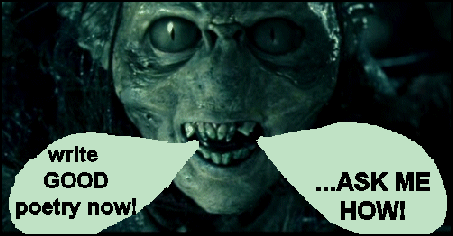
|
This 'attitude of the weary' comes about not through being overly generous to the point of exhaustion, but through not being generous at all. In the end all the hot air of our empty poetic words catch up with us until we are finally trapped beneath the balloon of non-action, breathing in our own carbon doxide, weakly pointing skywards to the next didactic poem to get away, to float past our undying sufferance. |
Our last words uttered will be, "But it was telling not showing".. You have to show it and while you're at it try not to show it too much, ... if you know what I mean. Question is: why do we suddenly (it hasn't always been that way and it isn't necessarily that way outside Australia) dismiss that 'simple' poetry that is seen as 'overtly' political, when it actually describes fact or 'tells it as it is' for a change.
Rather than decorating what is essentially a superfical shallow narcissistic core with empty intellectualism and tedious predictable cleverness for anyone with a mind two steps ahead of a Daycare Centre, can't we just do as Banjo Paterson, Henry Lawson, Kathleen Morgan, Tony Birch, Lisa Bellear, Allen Jesson, Sara Moss, Kerry Reed-Gilbert, Duncan Williams, Erica Jolly, Brenda Saunders, Thom The World Poet, Sandy Jeffs and Lionel Fogarty do and 'tell it as it is' for a change? Hey, put me on that list! I want to be there! You might be interested to hear that when the public reads a book that is straight to the point they say, "does this really happen?"
They may then go on to change the way that they think about the world for the better. They may even chose to empower themselves. Unfortunately, they then may think all Australian poetry is like that - that is, something that speaks to them. So I give them directions to the nearest rare poetry selling bookshop crossing my fingers and hoping for the best. Then I hide. But they come back and if they find me they say; "It wasn't like your poetry". (Uh-oh.) "I didn't really understand it". To which I reply, "um, you weren't meant to". (apologetic shrug). Should it be my responsibility to give them a refund? I mean, why should the middle class boy's club care, if the big bucks are rolling in from grants, prizes and various jaunts overseas with books in briefcase? Why bother with that popular culture or all those dummies out there, right? Elitism is after all, obscure. Isn't it?
The breaking news is, that 'poetry finally understood' is not a crime and nor is it dumb. So long as it doesn't challenge the way we think about things, then everything will be just fine, right? Without the honest straightforward approach to words there would be no honest straightforward emotional response, and no positive action taken and human society would be on the brink of psychopathy. Let's hope that isn't already happening! When the public read a book of poetry they tend to see the work through innocent eyes and as such they do not attach this political didactic polemical argument to the text, in the same way that the compassion-fatigued literary elite do. (Oops, I'm yawning again. It seems to be catching up with me.) Perhaps another poem about a bowl of fruit, a paper clip or a middle class white male midlife crisis will wake me up. And they wonder why no one west of Balmain buys their books! Well, come to think of it, no one in Balmain does either. Perhaps we can swap!
When the public reads poetry they simply read the words for what they are. They look for something they can mentally and emotionally connect to. They will often look for their own story in your words. Are you wise enough to know what that story is, or brave enough to be able to tell it? The public do not make politically motivated judgments on what poetry should be and shouldn't be and nor do they talk about the success or failure of the poem based upon that judgment. When the status quo is upheld through the narrow minded politically motivated Australian literary and arts community, and not through the reading buying public, then we have a problem not with the poetry itself that might be great, but with a petty little scene that not knowing how to grab a bite of the bigger apple, opts to turning its teeth into its own flesh and bone where it begins to gnaw. Tired of swimming in a pond with the piranhas? Then take a dip in the ocean with the public. Poetry is still read and it's still cool to be a poet. There is still hope for Australian poetry outside a scene. Some of the public may even be poets themselves.
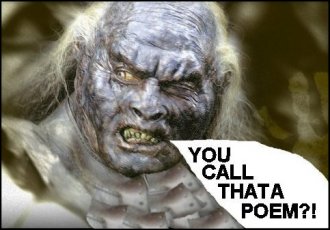 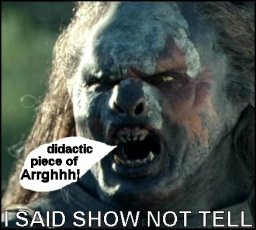
Who makes the rules in the money and power driven world of culture anyway? Certainly not the animals, the working class, or the ecosystems we are destroying. Certainly not the indigenous Australians. Someone else is always making their decisions for them or making them into false idols. But how many times have they gone out for coffee and a good yarn with them? In fact, most of those who have been 'wiped out' and are 'long gone' (including the Thylacine) took their poetry with them, that is, the poetry of their existence and the way they might have lived it and expressed it in the world, if we had written the poetry that supported them to begin with. Instead the culture turns barren and remote and we are left with nothing but secret landscapes and feeling like outsiders to the world. So we remain and they are gone. You could say, they are no longer eligible for funding. Less competition. Or perhaps I will win the big prize again next year with a few of my mates as the judges.
Are we allowed to 'tell it as it is' in poetry, or must we always skirt around the truth, not deliver the message, uphold the status quo, silence our own hearts, pretend it isn't happening, censor the reality, be awfully nice and shallow, mask 'the psychopath within', with that thin veener of so-called human civilsation? Must we obscure it, until we prove to ourselves how clever we are, because we will be the only ones to ever understand it? Must we talk primarily about how women (or ex-wives) screwed our lives up (yet again), while we form adolescent pseudo relationships with the opposite sex, as we admire 'her' back from beneath our sunlit sheets in the mornings? You know what that means, don't you? It means that she hung around for breakfast! Way to go. She may have even cooked it, while he contemplated inserting her name into his next great poetic masterpiece.
Now listen, and listen closely. I am sick and tired of this shallow and pretentious self-absorbred-anglo-middle-class-middle-age-narcissistic-male-dross and I want an immediate ban /censorship/ boycott on all lightweight-book-club-chardoney-hobbyist-newsletter-competition-winning-newspaper-published poetry in Australia, that explores the connection between the extreme intellectualism and any empty reflection outside a navel. I want a mirror that sees through me and reflects the world I belong to. I want the truth. (You want the truth? You can't handle the...oh, never mind). I want to call a spade a spade and forget that I am not allowed to say the word 'spiritual' or 'ethical' or 'god' if I want to the little literary doors to Mordor to open up for me.
Of course it is because the poetry system is not an upset apple cart, that we can continue to keep our high paying jobs and keep our little chapbooks of verse all nice and witty and cute, or as a little hobby on the side for a fading careerist. Yet another workshop about a mandarine or a photocopying machine (do they still exist?) to really challenge the psyche. Well, stuff that facade masking as a good poem! I will say it and I will not beat the words up into an exercise of meaningless pretention. Instead I will tell it as it happened to me and sometimes as it happened to them. I will tell you about children, about animals, about war and peace, about murder and torture and about what we are doing and what we are missing out on. I will tell it as it is. I will attempt to tell it as perhaps they would have told it, if they were still alive and they could speak. I will do my best. This does not mean that I am a bad poet or a political poet. It means that I am deliberately employing a style or method in order to make a statement on a fact.
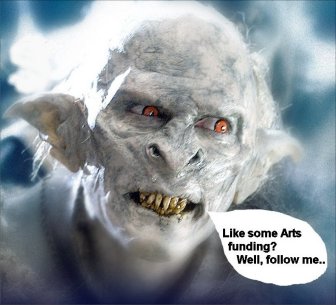
|
Let's use the 'Meat Is Murder' lyrics by The Smiths or the 'Give Peace a Chance' lyrics by John Lennon as two examples. They stated the obvious, they told the truth and it was good poetry. But I guess they were song writers. They weren't self pitying or clever enough to be poets. Such a poem would not be accepted in the safety zone of the Australian literary scene. Why? Oh, the message overode the poetry of course and we can't have that now can we? It might not be such a civilised friendly street anymore, if we have to face some truths about ourselves through poetry. Besides John Lennon was telling not showing. It was polemical, too political, too didactic, too in your face. I don't want to be bullied into compassion. Hell no. If I feel bullied into caring about others, well, I'm not going to do anything then, am I? |
I might even go the opposite way and take the lifelong nap of non-empathetic self-centredness and it will be all your fault. Now what I would like you to do, is tell me about things in a nice way, that is, in a polite way that is worthy of a seat at my next poetry work shop south of the Yarra (or in Sydney somewhere) and I would prefer that it be non-threatening at least before the next great literary dinner in someone's honour. It may turn our guests off the wine, cheese and goose liver pate!
The point is this: if you are a liver-eater who is being challenged at the next great literary dinner in someone's honour, then the poetry will come across as polemical, didactic, confronting and political. But if you are an ethical vegan the poetry will come across as truthful, distressing and factual. On the other hand, if you are an imprisoned animal or an abused child you may never hear the poetry, you may not be able to understand it, but it may save or at the very least speak of your life, your pathetic, brutalised tortured life finally spread out on the conscience table for everyone to feel. If the universe (with the assistance of us) is willing it may even save the lives of those who come after you. To say that 'meat is murder' is fact. To ask that we all 'give peace a chance' is smart. To think that 'harming others is wrong' is correct. It is not a question of stating the obvious that upsets people, because most people would 'not' necessarily see eating flesh as taking part in 'a murder' unless it was pointed out to them. Thus their reaction to this statement comes from a gulp that starts from the taste buds and rolls up into the brain to question the actions. If that poem dares to challenge me, I will be destabilised. Hence I will feel fear.
If they are particpating in this murder of animals and they want to continue along that line, then the poetry is going to disturb them. But not necessarily because it is 'bad' poetry, or even that to state the obvious such as 'Give Peace A Chance', is not poetry, but because it threatens their actions. This can only be a good thing, because if it didn't disturb them in some way, they would be hopelessly psychopathic. As it stands they are still in touch with their humanity and this is causing them a problem. They are like naughty little brats who have been caught out at the cookie jar when they were not supposed to be there and as such they are simply saying, "I do not like it when you tell me that I must change my actions in order to consider others". Well tough. I have said it once and I will say it again a hundred million times in a hundred million different ways and that is: while you choose to harm others (including children and animals) and disempower yourself with acts of ignorance and unkindness, I will continue to annoy you with my polemical political didactic poetry. So do we have a deal here?

A friend recently confided that she had been the victim of a child pervert. Might I ask her to speak in riddles in order to lessen the impact of her words upon myself? Am I going to ask her to show it and not tell it in order for her to more effectively convey her message that she was harmed and that child abuse is wrong? (What's all this fuss over right and wrong anyway? Who says it wrong to harm others? Who says what is right and what is wrong? Who says that 'good' and 'evil' exist? Perhaps the answer lies somewhere in between. Not!) So am I going to ask her to stop speaking the truth of the situation and namby pamby it up with language fit for a flower tub? No.
After all, the guy didn't give her a back rub, he molested her and her siblings for several years. He ruined their childhoods and that of many other children in Darwin and most likely their capacity to be involved in loving functional adult relationships, and I am going to say just that. I respect myself, and them and the world enough not to offer pathological lies hidden in a maze of cleverness in the place of the truth. The world of poetry needs our humanity to be applied. It needs our humanity to start surfacing soon or it is going to die and it is going to die at inhuman hands and because of our fearful silences. This is the fate of the suffering world. The good thing is that we can all choose kindness and truth at any moment and it only takes the smallest thought or action to cause that ripple effect in life and in art.
As far as the literary and art world in Australia are concerned, the fact is that there is room for all kinds of poetry saying all kinds of different things in all kinds of different ways; as long as it doesn't deliberately seek to be cruel to others, it's okay by me. I am not strictly opposed the 'witty ditties in the cities' or 'the celebration of male dominance poetry' or 'fear of my own mortality poetry' or the 'woe is me poetry' or 'contemplating my inner brat poetry' or 'poetry more shallow than two inches of bathwater' in the same way that I am not opposed to fifty year old bush poets remembering by-gone bullock teams from the 1800s and academics who would not step outside a university campus if a comet was about to hit the cafeteria. Even poetry that chooses to say nothing is okay. While it is not my 'kind of thing' it doesn't mean that it is 'bad poetry'. I get bored and fed up and horrifed by the subject matter but it might be a damn good poem. I don't make the rules and I wouldn't want to.
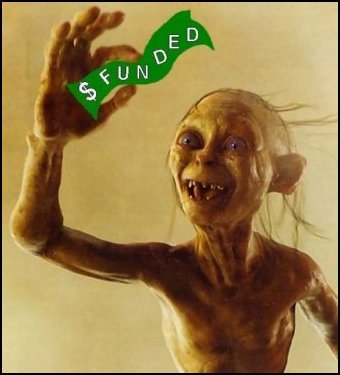
|
While I would prefer that the world be more ethical, honest, compassionate, sensitive, courageous and considerate, there is room for outrageously superficial pretentious shallow poets, as well as what usually occurs and that is the poetry of the speckled dappled sunlight in the clearing of the soul, in the many shades of shifting golden light in between all those who engage in conscious struggle. When you are next reviewing a book of poetry, then think about what the poetry is actually saying and not with your fears about what your lifestyle is and whether the poetry you are reading might challenge you on that. The truth can be revealed by either slowly parting the red curtain with gentle hands or quickly pulling the red curtain down in a fit of passion. The truth is the truth whether we are ready to take a look behind the red curtain or not. When I write poetry I can say, 'there is pure bloodshed occuring behind that red curtain' or I can say 'one moment when the world was blood, the curtain it was cast aside, as if the trickle on the floor had lead us there'. |
So does it matter whether we take the direct or indirect approach to life and our expression of the same? Is creative art a matter of urgency or meandering? I guess it depends whether it's the lives of yourself or your family or just some objectified notion of starvation via satellite who are at risk, as to whether you'd be in a rush to get your message across. Apathy comes from a sense of powerlessness. It comes from not having to work for your life or the lives of others. It is representative of a lack of purpose or a struggle within and without. Combined with a touch of psychopathy and a fear for your own self centred survival, both yourself, your poetry and the planet are in big trouble. There is nothing elite, high, intelligent or special about art or poetry that does not speak directly to the heart. It just takes a longer route in order to shine its light upon humanity.
Dr. Coral Hull (Editor)
Thylazine thanks the following people for their generosity: Anon ($100.00), Maggie Ball ($25.00), Di Bates ($60.00), Paul Hetherington ($30.00), Terry McArthur ($150.00), Liz-Hall Downs ($25.00), Anne Kellas ($10.00), Joyce Parkes ($20.00), Edith Wignell ($30.00) and Edwin Wilson ($50.00) and The Literature Board of The Australia Council for The Arts ($2,500.00) towards Thylazine No.9 and The Thylazine Foundation's charitable work.
A special thanks to the contributors; Melissa Ashley, Luke Davies, Coral Hull, (that's me), Richard Hillman, Allen Jesson, Stephen Kelen, Anne Kellas, Aileen Kelly, Paul Hardacre, Liz Hall-Downs, Paul Hetherington, Terry McArthur, Kathleen Morgan, Sara Moss, Sharon Olinka, Tom Shapcott, Barbara A Taylor, Elaine Schwager, Meredith Wattison, Warrick Wynne, Claudia Snell, Peter Meere, Leonie Meere for the feature of Francis Webb's poetry, and the many artists and photographers whose work is included in this issue.
And others; Artesian Productions, Beyond Images, Interactive Press, Kardoorair Press, Little Esther Books, Modern Writing Press, Sunline Press, The South Australian Writer's Centre, The Still Company, Textbase Publishing, University of Queensland Press, Wild Pheony and the poets who contribute their books for review, Kindi and Binda who renew my dreams on a daily basis, the black angus cows from Rylstone: Molly, Emma, Amanda, Stevie, Maggie, Ruby, Rachel, Faith and Caliban the steer; Charlie Rosenberg and the crew at The Institute for Global Communications (IGC) and The EnviroLink Network (San Francisco, USA) without whose assistance this website would not be possible.
About the Writer Coral Hull

|
Coral is the author of over 50 books of poetry, prose poetry, fiction, artwork and digital photography. Born in 1965 she was raised under disadvantaged circumstances in the working class suburb of Liverpool in Sydney's outer west. Coral became concerned with issues of social justice and spirituality from an early age. She wrote her first poem about a rainforest at age thirteen. Coral became an ethical vegan and an animal rights advocate who has since spent much of her life working voluntarily on behalf of animals and the environment, both as an individual and for various non-profit organisations. She is also the Executive Editor and Publisher of Thylazine; an electronic journal featuring articles, interviews and reviews of the recent work of Australian writers and artists. Coral Hull's complete works are now available from Artesian Productions (Darwin, Australia). Coral holds a Doctor of Creative Arts Degree (Creative Writing Major) from the University of Wollongong. An extensive biography, list of publications, festivals, interviews, articles and reviews are online. Coral is The Director of The Thylazine Foundation: Arts, Ethics and Literature. Coral Hull's work is in the public domain for non-commercial use under the Creative Commons License. |
[Above] Coral Hull, Elliot Hotel, Elliot, Northern Territory, Australia. (Photo by Coral Hull, 2001)
I Next I
Back I
Exit I
Thylazine No.9 (March, 2004) |



